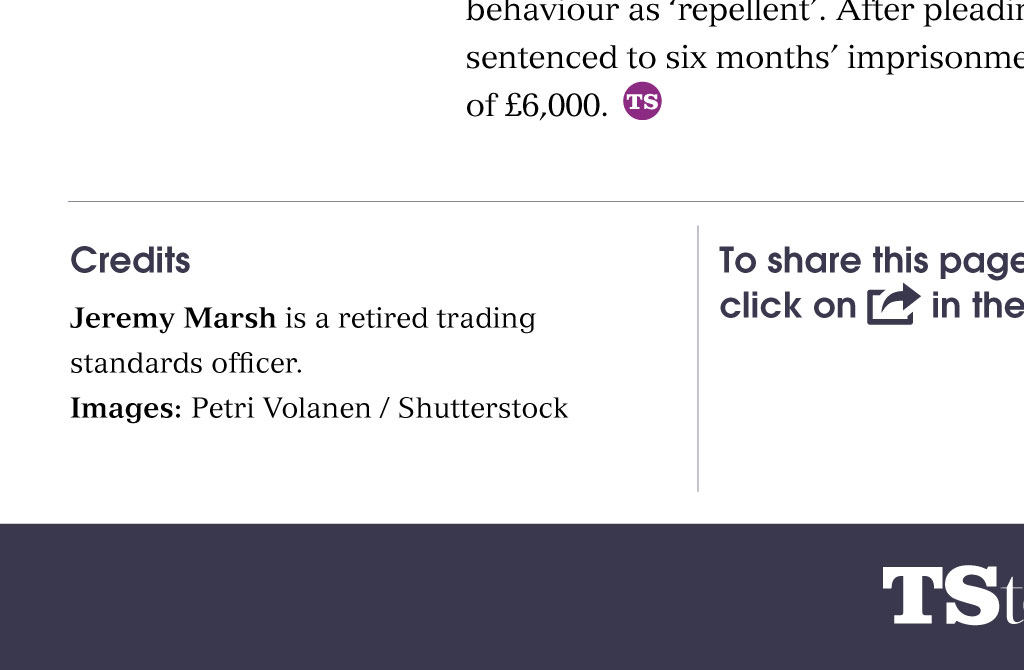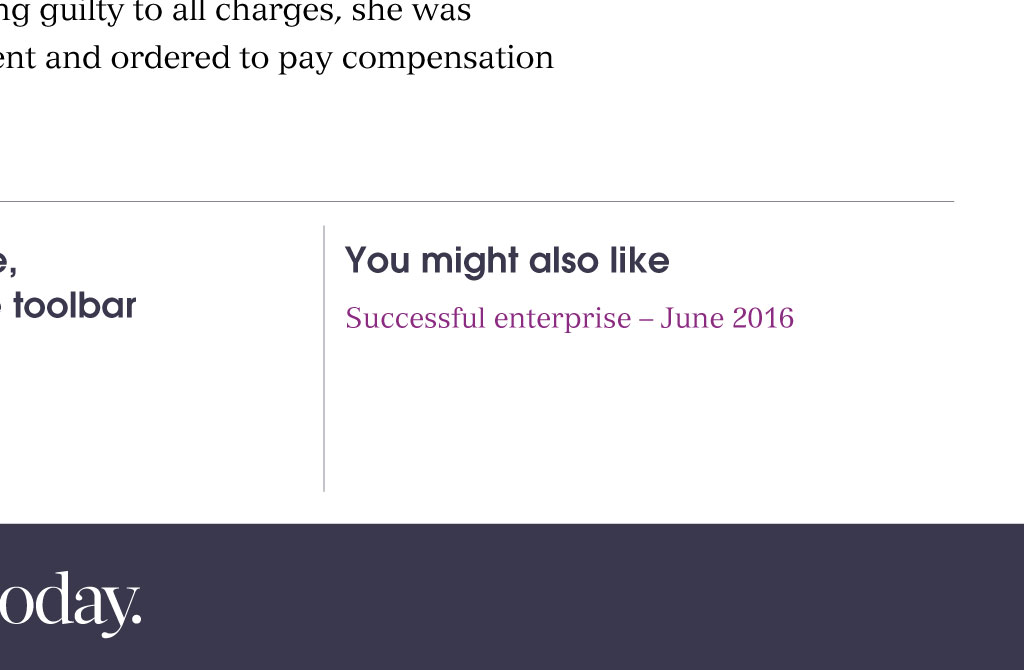


























Equestrian crimes: Kent Trading Standards In this feature misdescriptions cost obtaining statements Horse play When the police declined to take on a second case of horse traders misrepresenting animals to buyers, Kent Trading Standards took the reins and learnt a few things along the way. Jeremy Marsh explains M A well-known TV presenter had the misfortune to buy horses from the dealers in both cases any of you will be aware that Kent is known as the Garden of England, but it might also be described as the Stable of England, given the widespread horse ownership and the number of dealers in the county, some of whom are only too happy to take advantage of the trusting and gullible consumer looking to buy a horse for themselves or their children. When I joined Kent Trading Standards in 2005, my reputation as a regular racegoer and a betting man seemed to have preceded me, as one of the rst jobs I was given involved a dodgy tipster, who 10 years later was sentenced for common law conspiracy to defraud. However, our more usual villains have been those selling duff horses rather than duff information. Soon after I joined the profession, I identied a mother and daughter who were involved in selling horses and who were attracting a lot of complaints. These were as always a mixture of civil and criminal elements: allegations of misdescription and unsuitability for the purchaser; posing as private sellers; and failure to comply with Horse Passport Regulations. We interviewed both women and they accepted informal assurances. This was not ideal, but the challenges in prosecuting this type of case were already becoming apparent. Whereas you might be able to show that, say, a horse was not the age it was described as in the advert, or whether it had won a particular competition, the description of the suitability of the horse was invariably more subjective; vets who were happy enough to give their clients a report on the condition of a horse, were more reluctant to furnish us with one that would meet the criminal standard of proof; and the fact that only a minority of owners take the Horse Passport system seriously made the task of tracking down previous owners almost impossible. In virtually every case, the consumer had viewed and usually ridden the horse, which had seemed quite placid but, on purchase and return to the stables, the consumers alleged that the horse was not suitable for the purpose or person it had been bought for. Allegations were then made that the horse had been drugged, or was dehydrated, to ensure it behaved at the viewing. Serious consideration was given to carrying out a test purchase of a horse and having blood samples taken as part of the investigation, but our legal department had concerns, and the eye-watering cost of getting blood tested was also a barrier. However, by this stage in the investigation, the daughter was applying increasingly blatant misdescriptions to the horses she was offering for sale. After her mother had seen the error of her ways, the daughter had begun working with another woman and on the face of it a vet. These facts, together with reports of consumers being injured by horses, enabled me to get the police interested in the case. Because of the complexities, we agreed that the police should lead and, in April 2012, warrants were served at three stables and the premises of a vet. Eventually, two ofcers were put on the case full time, while I assisted in obtaining statements, and so on. The CPS was persuaded that this was a case for the police to prosecute and, in June of this year, the two horse dealers, Charlotte Johnson and Aniela Jurecka, and vet David Smith, were convicted of conspiracy to commit fraud at Kent Crown Court, after a 12-week trial. They were each sentenced to two and-a-half years in prison. It appears that mothers and daughters in Kent see selling horses as a career opportunity, since in 2011, we were contacted by colleagues in Gloucestershire Trading Standards, who had put together a report on another such couple who were also selling misdescribed horses. LES SONS LEARNE D Our experience strongly suggests that there are likely to be similar unreported offences the horses to those dreadful people. Similarly, the behaviour of some of TripAdvisor the dates of which tied in nicely with the horse sales. Hopefully, the issues raised here will occurring across the country. There is a our consumers who kept a running comparison to be drawn with clocked cars, commentary on internet forums of our assist any colleagues looking at similar but with the added issue that purchasers of actions, both real and imagined rings, but I would also suggest that horses often do not want to return the horse threatened to derail our case; on the authorities should consider setting up to the owner, even when becoming aware flip-side there was the extra information relationships with the plethora of equine of the facts. This emotional attachment we were able to obtain as a result of their publications out there. In my experience, to horses is both an advantage and comments. I was particularly impressed the individuals I dealt with were unfailingly disadvantage. All our original complainants by one person who tracked Rustons jaunts helpful, but their understanding under CPRs wanted something done, but not all were across Europe, paid for by her ill-gotten of their responsibilities as advertisers was prepared to assist us if it meant returning gains, through her effusive comments on definitely lacking. After discussions, we met Kent Police to see whether they would take over the case, but they declined. However, it became clear that this couple were still selling horses, and the mother, Karen Ruston who 10 years previously had committed similar offences in Wiltshire had, in particular, become increasingly brazen. Advertisements were being taken out in various equine publications under a variety of names with mobile numbers and/or email addresses. Our nancial investigator had obtained Rustons bank statements via a Proceeds of Crime Act application and we were able to show that the various noms de plume were connected to our person, while the sums entering her account tallied with the amounts paid by consumers. Statements from the equine publications also gave vital supportive evidence as Ruston, when placing the adverts, had often left clues to her identity among the cticious details postcodes or part addresses that tied in with other evidence. Similarly, telecommunications checks, although often ending with the dead end of pay-as-you-go mobiles, gave us useful evidence. However inventive these people are, they always make some mistakes. For example, one telephone had been topped up at the Londis store directly below where our suspect lived. Under siege One particular facet of the investigation that proved to be double-edged was the use of the internet. For almost the duration of the investigation, we found ourselves under siege from disgruntled consumers who, because we were limited in what we could tell them, had set up an online forum calling for something to be done. These included a well-known TV presenter who had had the misfortune to buy horses from the dealers in both cases. However, one element in our favour was the fact that this forum attracted the interest of previous owners of some of the horses, many of whom assisted in showing that the advertised history of the horse was fabricated. In one case we were able to show that Ruston had set up a false email account and had then purported to be one of the previous owners in an effort to to allay the concerns of a potential purchaser. This counterbalanced the difculties of persuading vets who had been employed by the consumers to assist actively in the investigation. The result was that we had to focus more on the selling practices of the sellers rather than the alleged misdescription of the horses. If preparing a similar case, I would seek even more assistance from colleagues in obtaining statements. Everyone rose to the challenge save one county which I wont mention and in all cases I got the statements relatively quickly. Where I tried to take statements by phone and/or email, good intentions were often trumped by tardiness, and I am sure that expert witnesses faced by a colleague in person would have found it harder to ignore me. I eventually put forward a report to the legal team that supported both offences of fraud and specic offences under trading standards legislation in particular Consumer Protection from Unfair Trading Regulations 2008 (CPRs) and Horse Passport offences. The case was heard in March and the judge described Rustons behaviour as repellent. After pleading guilty to all charges, she was sentenced to six months imprisonment and ordered to pay compensation of 6,000. Credits Jeremy Marsh is a retired trading standards ofcer. Images: Petri Volanen / Shutterstock To share this page, in the toolbar click on You might also like Successful enterprise June 2016